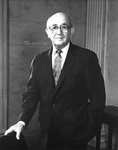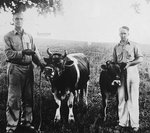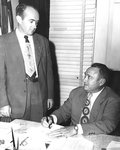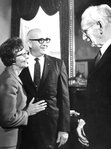Clear, 75°
Wind: mph,
Welcome to our new web site!
To give our readers a chance to experience all that our new website has to offer, we have made all content freely avaiable, through October 1, 2018.
During this time, print and digital subscribers will not need to log in to view our stories or e-editions.




Today’s political climate resembles a category five hurricane due to the highly charged division between the two political parties. Yes, both parties are to blame as neither truly looks for a middle ground. For most of my adult life, I have studied politics and government and in the last five years or so I’ve even thrown my hat into the political arena.
Yet, in recent months, I have grown a great disdain for party politics as the Republican and Democratic parties have failed to work together for the betterment of society.
It has always mattered to a great degree about party politics at the national level, but eventually, there comes a time to stop seeking blood for the betterment of our nation. In the 1980s, President Ronald Reagan and Democratic Speaker of the House Tip O’Neill were brutal adversaries but at the end of the day, they could take the boxing gloves off and share a drink.
Leading people and/or a nation is not about party affiliation, it is about doing what’s right for all the people, not just a select few. There comes a time when we have to cross the aisle and come to terms with one another. There is no room for the games and total dispersion of decency.
Now, let me put my soap box back under my desk.
This week, I would like to dedicate a little time remembering the late Tennessee congressman, Mr. Ed Jones. Congressman Jones represented the seventh and later the eighth Tennessee congressional district for over thirty years. He was a staunch Democrat but would cross the aisle when necessary for the betterment of humanity.
The story of Ed Jones starts in the small town of Yorkville, Tennessee. He was the eldest of three boys born to Will Frank Jones (1884–1971) and Sibbie Hortense Pipkin (1888–1974). His father was a laborer who worked odd jobs for local farmers. Will installed a strong work ethic into his son along with a love for agriculture. At an early age, he was required to work after school and on Saturdays.
When his father was unable to pay his medical bills, Ed began doing odd jobs for Dr. Finis Ewing Wyatt, the local country doctor. He would later marry Dr. Wyatt’s daughter, Llewellyn (married 1938). After high school, he attended and graduated from the University of Tennessee Junior College (UT Martin) in 1932 and attended the University of Tennessee Knoxville, majoring in agriculture.
In 1934, Jones began working as a dairy inspector for the State of Tennessee. He stayed in that role until 1941 when he transitioned as a supervisor for the Tennessee Dairy Products Association. In 1944, he became an agricultural agent for the Illinois Central Railroad, a job he held until 1969, except for the four years when he served in Governor Gordon Browning’s administration.
In 1949, Governor Browning appointed Jones Commissioner of Agriculture of Tennessee. He is the youngest person to serve as a commissioner. His education, public role, and business experience provided a foundation for helping to guide farm policy for Tennessee during a time of rapid technological change and social changes as many people left the rural farms.
His challenges included the transition of Tennessee agriculture from small family farms to commercial business operations. Jones created an assistant commissioner position to oversee the administrative operations so that he could focus on strategic issues involving animal health vaccination and inspections, artificial insemination for breeding dairy cattle, the establishment of a surplus food distribution program for schools, food safety inspections, and agricultural disaster response. Jones’ role as commissioner made him a public figure in West Tennessee.
As a former commissioner and dairy farmer, Jones’ knowledge was revered. So much so that in 1961, President John F. Kennedy appointed him chairman of the Agricultural Stabilization and Conservation Service state committee for Tennessee. He held that position until his election to Congress in 1969.
In 1951, Ed and Llewellyn inherited her family’s farm after the death of her mother, Ora Blanche Turner Wyatt (1877–1951). The Joneses renamed it “Oak Haven Farm” and called the property home for the duration of their life.
In March 1969, Jones won the Democratic nomination for a special election to replace Robert “Fats” Everett, Congressman from the 8th District in Northwest Tennessee, who had died while in office. The election was unusual in that it was contested not only by the Republicans but also by the American Independent Party (the party of segregationist George Wallace). Jones won with a substantial plurality and was sworn in as soon as the results were certified.
Jones was re-elected to a full term with less opposition in 1970. In 1972, Jones’ 8th District was merged with the Jackson-based 7th District held by Democrat Ray Blanton. The district retained the 7th moniker and its storied Democratic Party ties. To avoid a primary election, Blanton unsuccessfully ran for the United States Senate against Republican Howard Baker. Jones retained his seat easily even as Richard Nixon won 90 of Tennessee’s 95 counties, including most of his district. He was re-elected with no opposition in 1974.
In 1976, Martin businessman and state representative Larry Bates ran against Jones in the Democratic primary. This was the first and only serious challenge of any sort for Jones. Bates had a very conservative record as a state representative. His campaign platform was far right of the moderate Jones. Bates also spent a large amount of money by the standards of rural West Tennessee at the time. However, he made no real inroads in Jones’ support and was heavily defeated.
After the 1976 election, Jones coasted to five more terms and chose to run for a 10th full term (11th overall) in 1988. The Jackson Sun reported on February 14, 1988: “Jones says he’s retiring simply because the time has come. He wants to spend more time with his wife, Llew, and with his granddaughter, Meghan.”
In 1984, he chaired Albert Gore Jr.’s first U.S. Senate campaign.
During his time in Congress, Jones served on many agriculture-related boards and committees, all the while continuing to operate his farm near Yorkville. He was the second-ranking Democrat on the House Agriculture Committee, where he chaired the Conservation, Credit and Rural Development Subcommittee. Many of the U.S. Department of Agriculture’s program authorities today were authored by Jones in the areas of soil and water conservation, farm and rural business credit, commodities trading, rural development and agricultural trade.
In 2011, he was inducted as the thirteenth member of the Tennessee Agricultural Hall of Fame in recognition of his service to Tennessee.
His Congressional papers (1969-1988) are housed in the special collections of the Paul Meek Library at UT Martin. They include 121 linear feet of paper files organized in five series, Correspondence, Legislation, Projects, Committees, and Public Relations. The collection includes over 250 audio tapes from two periods, (1969–72) and (1987–88).
After retiring from Congress, he farmed, did some public relations consulting work and was active in civic and volunteer groups in Tennessee. He had served as Chairman of the Board of Trustees of Bethel College in McKenzie.
On December 11, 1999, Jones died at age 87, in Dyer, Tennessee. He was buried at Yorkville Cemetery. His wife, Llewellyn, died on November 25, 2007, and was interred next to Ed.